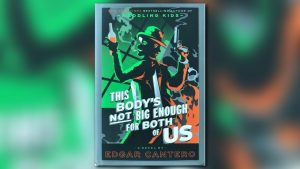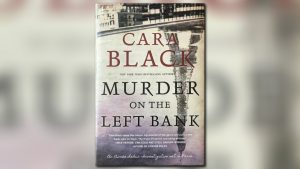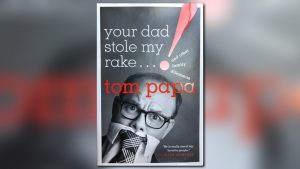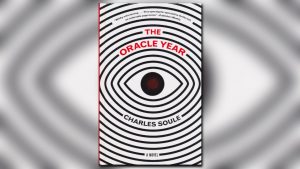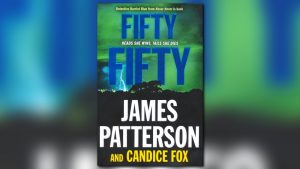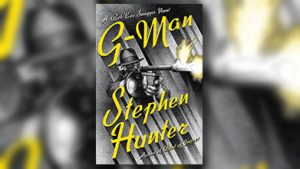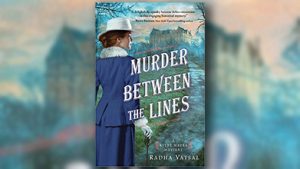Long Way Down is the third book in the Mortal Bonds series, following the story of federal prisoner and former financial investigator Jason Stafford.
Stafford meets fellow prisoner Phillip Haley, and the two investigate the case that led to Haley’s indictment.
Soon this investigation turns deadly, with threats towards Stafford himself, his family, his fiancée and his young son.
This thriller is filled with deception, deceit and what Jason Stafford does best: detecting lies.
ALBERTO RIOS: Welcome to "Books & Company." Bienvenidos, todos. I'm your host, Alberto Ríos. We're joined today by Michael Sears, talking about his latest book, "Long Way Down." Welcome, Michael.
MICHAEL SEARS: Thank you very much, Alberto.
11:12:54:01 Glad to be here.
ALBERTO RIOS: This book is I think a book of its times. It's about contemporary technologies, issues, ethics, geographies, and I think that was a pretty ingenious way to approach the next stage in novel writing. Have you thought much about that as you were sitting down to write this?
MICHEAL SEARS: Of novel writing.
ALBERTO RIOS: You can't use a pen, you can't use a typewriter. You've got to incorporate now new things.
MICHEAL SEARS: I do. I do. I do use a pen. [ Laughter ]
ALBERTO RIOS: You yourself.
MICHEAL SEARS: Legal pens and those black and white marble-covered composition books.
And I also use a computer. And one of the things I'm finding, the longer I go on with the series is that technology is catching up with Jason Stafford and with his business of investigating. It's very important to him.
ALBERTO RIOS: Why don't you give us a short synopsis of the story before we go forward?
MICHEAL SEARS: Jason Stafford is a ex-Wall Street hot shot who went to prison for a couple of years for fraud. When he comes back out, he's only employable investigating fraud for other firms. He's assigned to look into a case of a CEO who's been accused of insider trading. And as complications ensue, there are murders, and an awful lot more crime involved.
ALBERTO RIOS: It's making me laugh in that it's post-crime crime, right? Like postmodernism only it's, okay. That's how far along we are. The character, Jason, is anintriguing character but he's surrounded by another group of characters. One group at home or what we might call home and one group that's more professional, at work or at his work.
MICHEAL SEARS: Yes.
ALBERTO RIOS: Now at home, he's got somebody very important to the plot: His son.
MICHEAL SEARS: The kid who decided that there was already one Jason in the house so he could not be called that and he chose his name, the kid. He's very important to the plot. The kid suffers from autism. And he is somewhere on the other side of the spectrum from aspies and he makes a challenge for Jason. I really wanted something that would help humanize Jason and something that would continue over a long period of time. A challenge to make him more human, and I don't think there are too many things more challenging than being the parent, especially a single parent, of an autistic child.
ALBERTO RIOS: And I think one of the ways you really do humanize this condition is it's not a book about autism. He is simply a character. And amongst other characters. And so the spotlight is not inordinately pointed at him. He's part of a greater ensemble and maybe that's a way of humanizing it, too.
MICHEAL SEARS: As you say, it's not a story about autism but he is central to the main character's life and will always be so.
ALBERTO RIOS: You talk about the ordered life of somebody with autism. It struck me that it's remarkably similar to the ordered life of the financial world.
MICHEAL SEARS: Well, there are parallels, definitely, and many of jason's particular quirks may give a slight hint to why his son is on the autistic spectrum.
ALBERTO RIOS: That's an intriguing little statement about Jason.
MICHEAL SEARS: Yeah.
ALBERTO RIOS: So we have his significant other also, who goes by several names.
MICHEAL SEARS: Yes.
ALBERTO RIOS: His name for her and her name.
MICHEAL SEARS: Her name is Wanda. And a Greek restaurateur had a nickname for her, skelly, and it's a very bad pun on legs.
ALBERTO RIOS: Okay, this idea of a loose family structure gives Jason some reason to do the things that he's doing. I don't think he's doing it just for himself.
MICHEAL SEARS: Well, raising an autistic child anywhere is challenging. In New York City, a school for children like that costs more than Harvard. So Jason has a real need to make a decent income, and this is really the only way he can do it at this point.
ALBERTO RIOS: Income is an interesting part of this story. Money doesn't seem to be a problem per se and yet money is at the heart of everything. [ Laughter ]
MICHEAL SEARS: Jason's whole life up until the kid was involved with money. He was a foreign exchange trader. He ran a foreign exchange trading desk at a large bank. And he is -- he is a bit of a financial and mathematical not quite genius but savant who can manipulate numbers very easily and is very comfortable in that world.
ALBERTO RIOS:Numbers and geography. He's got that same facility with maps, right?
MICHEAL SEARS: He's got this quirk that he definitely inherited from his father of -- he looks at a map, and it's there. And then he has this odd compulsion that he has to plot out every possible route from one place to another. And at one point in the book, I got him out in the southwest, where the alternatives shrink considerably. There aren't many roads to choose from, from Santa Fe to Denver.
ALBERTO RIOS: That's right. That you were saying gives it a little bit of insight into why his son might be autistic. These are just quirks in Jason. They are more seriously found in the kid but we can see a shared focus, let's say.
MICHEAL SEARS: That's what I was hoping to accomplish with it.
ALBERTO RIOS: And together, they actually form an interesting tandem in that Jason finds positive energy in these obsessions that gives him a lot of patience with his son.
MICHEAL SEARS: And patience, and I think a sense of humor are really the two greatest things that you need.
ALBERTO RIOS: There is some great humor in this book. And there's a couple, I made a note here, Mr. Spock has a wider range of emotion was one I thought was pretty funny. He was not talking about his son at that point. My favorite is -- was -- let me see if I can find it. She instructed him to do something anatomically impossible but she said it in such a way that you knew she came from a good family. I fell off my chair. How do you come up with a line like that? Where does humor come from I guess?
MICHEAL SEARS: Oh, gosh I have to instill humor in my book, in all of them, it's -- I grew up reading pogo comics. My wife thinks I'm weird often but I enjoy it.
ALBERTO RIOS: Finding humor in the difficult moment is an art form I think. It's not an easy humor.
MICHEAL SEARS: No.
ALBERTO RIOS: And so maybe you could talk a little bit about, is there such a thing as difficult humor?
MICHEAL SEARS: Certainly any policeman or E.R. worker will definitely tell you that weird humor gets you through. And it's actually not a whole lot different on a trading desk. There are times of incredible stress and sometimes, people go over the edge and yell and scream. Other times, it's a whole lot better to just come out with something absolutely outrageous and laugh it off.
ALBERTO RIOS: These are movies where they show the floor. This was also part of your life personally. Can you talk a little bit about that?
MICHEAL SEARS: I did not trade on the stock exchange floor. I traded on a trading floor where the lines of desks with salesmen and traders all intermingled with lots of computer banks around us, and tons of input, informational and communication input all day long and making decisions and reversing them and going on to the next one, over and over and over. And someone asked me the other day about my outlook on the economy and I said I spent 22 years trading with an outlook that was maybe a few minutes.
ALBERTO RIOS: How could you get sleep in anenvironment like that?
MICHEAL SEARS: I sleep much better these days.
ALBERTO RIOS: I can imagine. That input of information makes you think there's even more out there.
MICHEAL SEARS: And there were the calls from Tokyo in the middle of the night, what's going on in your market? We need a bid on this, whatnot. And I would get up out of bed and have to be on immediately.
ALBERTO RIOS: Jason, in the novel, is not that kind of a trader is he?
MICHEAL SEARS: He was.
ALBERTO RIOS: And that got him into some trouble which I don't think I'm giving anything away.
MICHEAL SEARS: Yeah, I describe it in greater detail in the first book.
ALBERTO RIOS: We should say this is the third in a series.
MICHEAL SEARS: Yes, yep. He made a mistake. He put the wrong trade date on a ticket, and then it showed in his favor and he just kept building on this and building on it. And this exact mistake that he made is criminal. He went to prison for it. And it is something that a lot of people have done. And some of them got caught and some of them probably didn't and some of them were smart enough to take the lump the first day and fix it. And didn't have to go to prison. But it was the cover-up, it was not the act.
ALBERTO RIOS: I would like to just take a moment to thank our viewers for joining us. You're watching "Books & Company," I'm your most Alberto Ríos. We're joined today by Michael Sears, talking about his latest book, "Long Way Down," third I a series. Jason Stafford is the main character and he's been to jail you were saying. He's learned from that, though. As I said this particular book, it's not -- of course, no one wants to go to jail but he doesn't dwell on it. He seems to get that there was some piper to pay.
MICHEAL SEARS: He's beginning to. Not quite there yet. And he is resistant to that, that there's a part of him that says I made mistakes, I did not intend to create a huge fraud and, as a matter of fact, no one was really hurt. It wasn't that I stole money. I overstated earnings.
ALBERTO RIOS: And you make -- I think
11:26:14:06 that's a fine point in the book,
11:26:16:05 trying to come to terms with
11:26:18:02 where the criminality is.
MICHEAL SEARS: Thank you. That line of where criminality starts is very important to me, and it's very hard when you're in that environment to know exactly where it is all the time. There's incredible stress to produce. There are tremendous opportunities to fudge things and there's a lot of money lying around. It's easy to just pick some of it up. And people do. However, most people don't. The business would collapse if everybody on Wall Street was a crook.
ALBERTO RIOS: And yet, it seems to me that everybody knows somebody is doing it.
MICHEAL SEARS: Yes.
ALBERTO RIOS: And so you wrestle with that. It's always a moral decision perhaps, maybe it's not that hard. Maybe it's not elevated to that level of being a moral decision every day. But maybe it is.
MICHEAL SEARS: I don't think it is every day. But I think any trader, any salesman who's been there for a while has faced those kinds of moral decisions and as I say, most of them err on the side of right.
ALBERTO RIOS: It's a testament to something.
MICHEAL SEARS: Yes.
ALBERTO RIOS: I wonder what you would say, what genre does this book fall into? What tradition? Is it a detective fiction? Is it a thriller?
MICHEAL SEARS: Yes, yes.
ALBERTO RIOS: Yes, yes, all of those.
MICHEAL SEARS: The first book set out a novel.
ALBERTO RIOS: A novel.
MICHEAL SEARS: It's that, too. There are financial crimes in all of my books. However, I really try to give a little bit of education about markets and how things work. But I also aim that if you don't get it, just if you understand the emotional importance of it, it's really no more complicated than Christie writing a book about somebody stealing grandma's jewels.
ALBERTO RIOS: You deal with the layers of rabbit holes. There's the layer of understanding how the markets work but you work also with all the ways they can be manipulated, that's part of what happens and the intentionality of the crime and so on. And that there might be a play on that and a play on that. That part is pretty resonant and a lot of fun. It's part of what makes the book fun to read is there are layers tune cover beyond how it ought to work. Well, it seems to me there are some homages to different things. There's a hard-boiled detective moment, for example. There's one I noted, the cold air hit like a third shot of vodka. That's not what the book is. But there are occasional nods to the traditions of uncovering work and just the dailiness of getting through it.
MICHEAL SEARS: This is, you know, my heros were Dashel Hannet and Robert Parker and on and on. So if some of that comes through, I'm not surprised.
ALBERTO RIOS: You have -- it goes beyond that simple metaphorical statement or that quick connection to something and you get philosophical sometimes, and I think it's beyond the story and I have to say I think they were enjoyable moments where you said something like, they were on the highway and there had been an accident and the character said, the last accident had just been cleared. In front of our eyes. And the madness began again, immediately, right? There's a philosophical underpinning to that, and it's just like the markets he was about to face and the crimes. There's an inexorable continuing of everything.
MICHEAL SEARS: I think this is part of Jason's awakening and greater awareness of the world, too. That his world was pretty circumscribed before all of this blew up on him.
ALBERTO RIOS: And it's not that he gets wiser necessarily. He gets smarter I suppose and wisdom comes a little more slowly. But there are those moments of lucidity that he has and one that I liked was he has – one of the characters, he was an epiphany, looking at one of the characters and he said it occurred to me for the first time that he was almost 20 years younger than I was. He probably looked up to me. He probably thought I knew what I was doing. [ Laughter ] He has a moment of self-understanding and also beyond himself to those around him, that it's a part of his character that's evolving.
MICHEAL SEARS: That's -- that – that particular thing is something that I experienced being a manager at a trading desk and bringing along young traders and turning them into seasoned pros and knowing all the time I don't know everything. I don't have any answers.
ALBERTO RIOS: Leading the risk. Letting somebody understand that maybe that's all there is to
know, it's the risk. That's a hard one. But I think there's a philosophical underpinning to that that is self-awareness and he at least comes to understand somebody's following him now. He doesn't have to like it. And he doesn't have to even think they're smart in doing that but there they are and there he is, right? You have a lot of also technical and reasonably scientific information, maybe I would call physics. You throw occasional phrases in there. And they become important. A simple one, generic one is luck is not a substitute for action. That's not true physics but it's science, you've got to do something, you can't just think it. And I think that's important in the story altogether.
MICHEAL SEARS: Luck is very important to Jason and his relationship with luck is very important, too. He knows how valuable it was when he was a trader. He knows what happens when it's gone. And yet at the same time, having it is no excuse for not working hard.
ALBERTO RIOS: He also talks later about some thugs that are coming after him. And he says they might be hard to stop, though, once they got going, force equals mass times acceleration. That's great, and he's talking about these guys but I went back again to the crime, that it might have pertinence to the nature of the crime.
MICHEAL SEARS: Yes, and that's an interesting catch. Jason also has in addition to the physics a number of mathematical quirks and he sees relationships immediately in numbers, often that have really no relevance to anything other than the fact that they're there in front of him and he sees the world that way.
ALBERTO RIOS: Also in the process of the plot, you come up with occasional corners of interesting scientific -- it is scientific information, something like the moment where you talked about dry drowning, which I had never heard of. Do you remember that? I can read it.
MICHEAL SEARS: Go ahead.
ALBERTO RIOS: You can drown by inhaling an ounce or less of water. The lungs sense the intrusion and the airways seize up. Your body suffocates you. It's called dry drowning. I had never heard of that.
MICHEAL SEARS: You can look it up.
ALBERTO RIOS: You can look it up, all right, all right. I think those things, though, what I liked about them is you are throwing them out and they seem to be of the moment but they have vibes, they're out there.
MICHEAL SEARS: Great.
ALBERTO RIOS: Were you doing that intentionally?
MICHEAL SEARS: Well, I think that the way I work, I write scenes. I don't always write them in order. And through that, I get to a point where I've got half a dozen or two dozen scenes and I have an idea of what the crime is about. But I don't see all of the thematic threads until I have these scenes in place, and then I start to see oh, I included this odd little thing in here. I'm definitely going to work that through in the rest of the book.
ALBERTO RIOS: I think that's a great answer. Because I think that's how it really works, right. I don't think there's a big -- we want to think there's some big genius approach to this.
MICHEAL SEARS: Oh, well! Go right ahead!
ALBERTO RIOS: But I do think you write these things and language and the human mind, all of these things make connections and they would even in spite of us, even if we tried to stop them. I'm going to finish with one more thing. You had this great insight about what the edge is in working with computers. You have this little moment where you say the edge is English.
MICHEAL SEARS: Oh, yes.
ALBERTO RIOS: Do you remember that? Which I thought was fascinating.
MICHEAL SEARS: That the original languages for computers were developed by people who spoke English. So that's kind of built into the initial -- so there is always an edge for someone who was raised speaking English and sees the world in those terms. And I'm sure these are skills that could be far surpassed by, you know, due diligence on someone's part.
ALBERTO RIOS: And yet we talk about things like syntax in computer writing and all those sorts of things and it would make sense that somebody would have – if somebody's trying to create a spoof or something, you have the edge if you know how language works and if that language is what's encoded into the computer.
MICHEAL SEARS: Yes.
ALBERTO RIOS: Well, I want to thank you for talking about your book today, this "Long Way Down." It's a great part of a series that's greater, I think you're on to some things, these characters are evolving, that's always fun to watch. That the main character went to jail I think is a pretty good -- so thank you. I want to thank all our viewers also for joining us today. You've been watching "Books & Company." I'm your host Alberto Ríos. We've been joined today by Michael Sears, talking about his latest book, "Long Way Down." Please join us again next time when we'll be bringing you another good book. Michael, thanks for joining us.
MICHEAL SEARS: Thank you very much.
ANNOUNCER: "Books & Company" is made possible by the department of English at Arizona State University and by the Friends of Eight, members of eight, Arizona PBS who give additional gifts to support original programs. Thank you.








